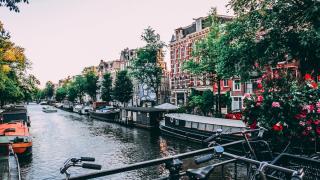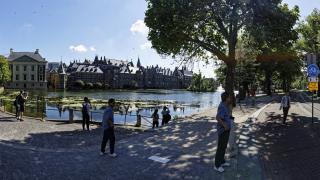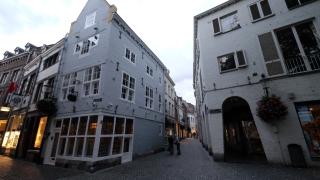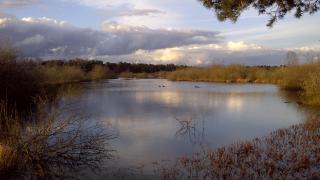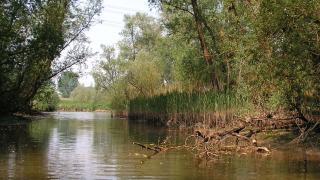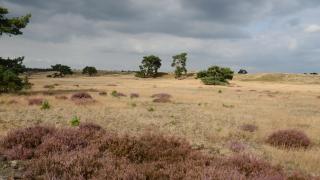Dutch B&B Experience
Bed and Breakfasts in the Netherlands offer a local, personal experience. Many are in historic canal houses, converted farms, or monumental buildings. Typical settings include Amsterdam's Jordaan, Utrecht's wharf cellars, and Friesland's countryside. Hosts often live on site. They provide local advice and Dutch ontbijt (breakfast) with regional cheeses and breads. B&Bs are usually small, with 1-7 rooms. Prices range from €60-€130 per night, depending on city and season. Most guests stay 1-3 nights. Many B&Bs are within walking distance of train stations or city centers. Travelers choose B&Bs for:
- Direct contact with Dutch hosts
- Authentic interiors, such as Delft tiles or wooden beams
- Quiet, residential neighborhoods
- Flexible check-in, often by appointment
- Local products at breakfast, like hagelslag and stroopwafels
B&Bs must meet Dutch fire safety and municipal rules. Owners often highlight unique features, such as canal views or tulip fields. Guests experience daily Dutch life, not just tourist sites.
Types of B&Bs Across the Country
Dutch B&Bs vary by region and setting.
-
Urban B&Bs are common in Amsterdam, Utrecht, and Rotterdam. Many are in canal houses or modern apartments. Prices in Amsterdam start from €90 per night. Stays often include breakfast with local bread and cheese. City B&Bs are usually within walking distance of museums and stations.
-
Rural B&Bs are found in Friesland, Drenthe, and Gelderland. Many are on working farms (boerderij), near dykes, or among tulip fields. Typical rates range from €65 to €100 per night. Guests can rent bikes or join farm activities. Distances to towns may be 5–15 km.
-
Coastal B&Bs are popular in Zeeland, Texel, and the Wadden Islands. Many are in former fisherman’s cottages or duneside villas. Prices start at €80 per night. Some offer sea views or beach access. Ferry travel to islands like Texel takes 20 minutes from Den Helder.
-
Unique B&Bs include windmills (molens), houseboats (woonboten), and Rijksmonument historic homes. Windmill B&Bs are found in Kinderdijk and Zaanse Schans. Houseboat stays are common in Amsterdam canals. Historic B&Bs often date from the 17th century.
Booking and Budgeting Essentials
Dutch B&B prices vary by region and season.
- In Amsterdam, expect €90–€180 per night for two people.
- In smaller towns or rural areas, prices start from €60–€120 per night.
- Most B&Bs charge per room, not per person.
- Breakfast is almost always included. Dutch ontbijt typically features bread, cheese, cold cuts, and local specialties.
- Tourist tax (toeristenbelasting) is often not included. It ranges from €2–€7 per person, per night.
- Bookings are best made on Dutch sites like Bedandbreakfast.nl, Bedandbreakfast.eu, or local VVV (tourist office) websites.
- Many B&Bs also accept direct reservations by email or phone.
- Payment methods vary. Some accept only cash or Dutch PIN cards. Credit cards are less common outside cities.
- Cancellation policies differ. Flexible rates may allow free cancellation up to 7 days before arrival. Non-refundable rates are cheaper but strict.
- Prices rise during tulip season (April–May), King’s Day, and major events.
- Early booking is essential in Amsterdam and popular regions.
- Minimum stay requirements are common on weekends and holidays.
- Amenities often include Wi-Fi, private bathrooms, and bicycle storage. Parking is rare in city centers.
What to Expect: Amenities & House Rules
Most Dutch B&Bs offer free Wi-Fi. Many provide bicycles for rent, typically €8–€12 per day. Private bathrooms are common, but shared facilities exist, especially in historic canal houses. Dutch ontbijt (breakfast) usually includes fresh bread, local cheese, cold cuts, boiled eggs, and hagelslag (chocolate sprinkles). Breakfast is served between 07:30–10:00. Some B&Bs offer vegan or gluten-free options if requested in advance.
- Quiet hours are standard from 22:00 to 07:00.
- Smoking indoors is prohibited by law; some allow smoking in the garden or balcony.
- Pets are rarely allowed; always confirm in advance.
- Guests are often asked to remove shoes inside, especially in rural B&Bs.
Historic Dutch buildings may have steep stairs and no lift. Accessibility varies; check before booking if you need ground-floor rooms. Many B&Bs are owner-occupied. Hosts may live on-site and offer local tips. Some provide full privacy with self-check-in. Others expect brief check-in between 15:00–18:00. Check-out is usually by 11:00. Payment is often by card or bank transfer; cash is less common. City tax (toeristenbelasting) is charged separately, usually €2–€7 per person per night.
Insider Tips for a Memorable Stay
Connect with your Dutch host for local tips. Most hosts speak English and enjoy sharing neighborhood secrets. Ask about local markets, cycling routes, or hidden hofjes.
Respect Dutch customs. Remove shoes if asked. Greet with a handshake or "Goedemorgen." Avoid loud voices, especially in historic houses with thin walls.
Pack for the Dutch climate. Bring a rain jacket and layers, even in summer. Many B&Bs provide slippers but not always toiletries.
Special requests are common. Inform your host of dietary needs (vegan, gluten-free) at least 48 hours before arrival. Late check-in is possible, but always confirm in advance. Some B&Bs offer packed lunches for day trips—ask ahead.
Look for standout B&Bs. Seek Rijksmonument status, canal views, or converted windmills. Unique B&Bs often feature local art, Dutch design, or breakfast with regional cheeses.
Payment and communication. Many small B&Bs prefer PIN or cash (euros). WhatsApp is commonly used for quick communication.
Stay minimums. Some Dutch B&Bs require a two-night stay, especially weekends or tulip season. Book early for April–May.
Quick Reference: Planning Your B&B Adventure
Checklist for Dutch B&Bs:
- Book early for weekends and holidays, especially in Amsterdam or coastal towns.
- Use Dutch platforms like Bedandbreakfast.nl and Natuurhuisje.nl for local listings.
- Check cancellation policies; many Dutch B&Bs require advance notice for refunds.
- Confirm check-in times. Typical check-in is 15:00–18:00; late arrivals may not be possible.
- Ask about bike storage if cycling. Many B&Bs offer secure fiets (bicycle) parking.
- Verify accessibility. Historic canal houses often have steep stairs and no lifts.
- Check if ontbijt (breakfast) is included. Some B&Bs offer self-catering only.
- Local regulations may limit maximum guest numbers per property. Always confirm before booking.
- Payment is often by bank transfer or PIN; cash is less common.
- Bring a copy of your ID. Dutch hosts must register guest details for local authorities.
